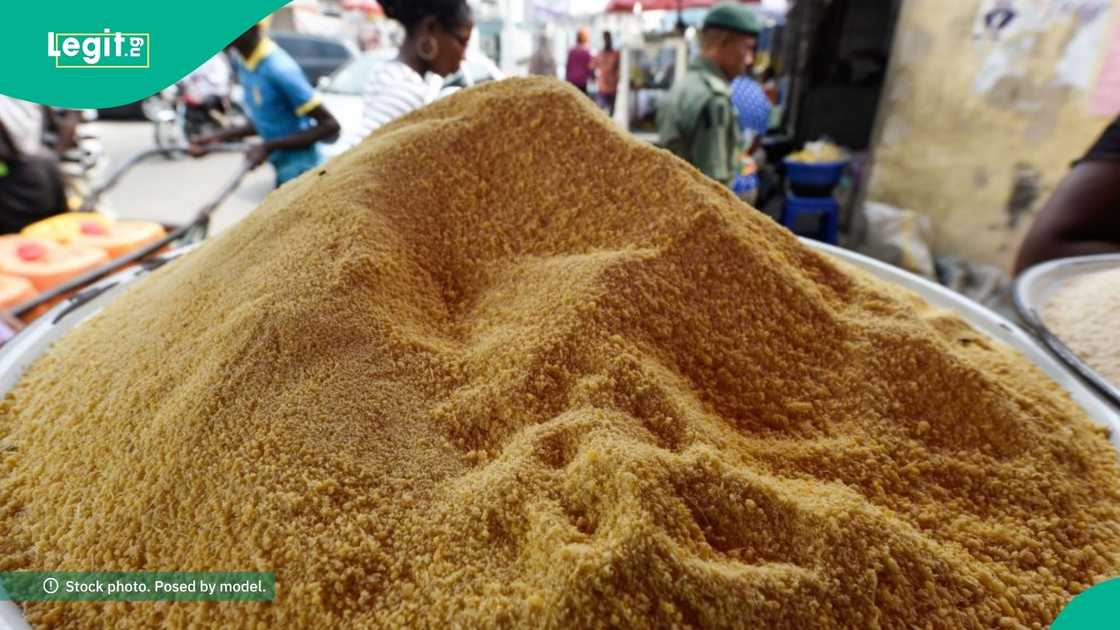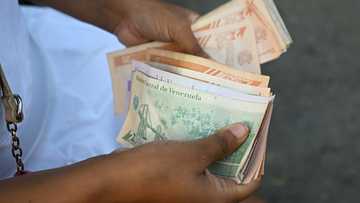Garri Price Crashes by N1,800 As FG Inches Closer to 2025 Inflation Target
- The price of garri has dropped sharply nationwide as cassava abundance forces down increased supply
- Checks across major markets showed that both small “paint” buckets and 60kg bags of garri have declined
- The National Bureau of Statistics (NBS) has reported a continued decline in Nigeria’s inflation rate
Legit.ng journalist Dave Ibemere has over a decade of business journalism experience with in-depth knowledge of the Nigerian economy, stocks, and general market trends.
A large cassava harvest has pushed down garri prices in many markets across Nigeria, giving consumers some relief as inflation continues to fall.

Source: Getty Images
A BusinessDay market survey showed that the price of yellow garri small “paint” bucket has dropped by 51%, from N3,500 in 2024 to N1,700 in 2025.
While a 60kg bag of yellow garri now sells for N20,000, down from N42,000 last year, a 52% decline.
Farmers in regions like Oyo and Ogun states say the drastic fall is hurting profitability, as the cassava glut has led to an oversupply in local markets.

Read also
Nigeria’s FX inflows fall to $672m despite naira strengthening at both official and black markets
Inflation figures drop
Similarly, the National Bureau of Statistics (NBS) reported a continued decline in Nigeria’s inflation rate.
According to the latest Consumer Price Index (CPI) report, Nigeria’s headline inflation eased to 16.05% in October 2025, down from 18.02% in September, marking one of the biggest monthly declines recorded in recent years.
The October rate is also 17.82 percentage points lower than the 33.88% posted in October 2024.
The CPI measures the average change over time in the prices of goods and services consumed by Nigerians.
How inflation dropped in 2025
The federal government has attributed the rapid moderation of inflation to multiple factors, including the rebasing of the CPI, which wiped off 10.32% from the inflation database.
A reduction in food prices, especially grains and cassava-based products. A stronger naira, which slightly reduced the cost of imported goods.
The new inflation means that President Bola Tinubu's projected 15% by the end of 2025, captured in the 2025 Appropriation Bill submitted to the National Assembly in 2024, is nearing actualisation.
According to the NBS:
“On a month-on-month basis, the headline inflation rate in October 2025 was 0.93%, which was 0.21 percentage points higher than the 0.72% recorded in September.”
It added that the twelve-month average inflation rate stood at 21.61%, down from 26.12% in October 2024.

Source: Facebook
Food inflation
The Food inflation rate in October 2025 was 13.12% on a year-on-year basis. This was 26.04% points lower compared to the rate recorded in October 2024 (39.16%).
However, on a month-on-month basis, the Food inflation rate in October 2025 was -0.37%, up by 1.21% compared to September 2025 ( 1.57%).
NBS gave the reason for the decline as follow:
"The increase can be attributed to the rate of increase in the average prices of Onions (Fresh), Fruits (Oranges, Pineapple), Shrimp, Groundnuts (Unshelled), Vegetables (Ugu, Okazi leaf), and Meat (Goat meat, Cow tail, Liver), among others."
Expert's reaction
Economic analyst Muda Yusuf told Legit.ng that while the figures show progress, risks remain.
He said:
“Nigeria’s sharp drop in inflation for October 2025 is a positive sign for economic stability, but many families are not yet feeling the impact because key structural challenges remain, particularly in food production, transport, energy, housing, and essential services.
"For the decline in inflation to truly ease living costs, Nigeria needs consistent and targeted reforms across major sectors. With better coordination between monetary, fiscal, and structural policies, the current progress can be deepened and maintained.”
Food prices drop
Earlier, Legit.ng reported that the costs of major food staples are falling, supported by the harvest season and improved supply reaching urban markets.
This was highlighted in a recent commodity price update from Financial Derivatives Company Limited, which noted that key staples, including garri, rice, beans, and palm oil, are currently experiencing a downward price trend.
Proofreading by James Ojo, copy editor at Legit.ng.
Source: Legit.ng



